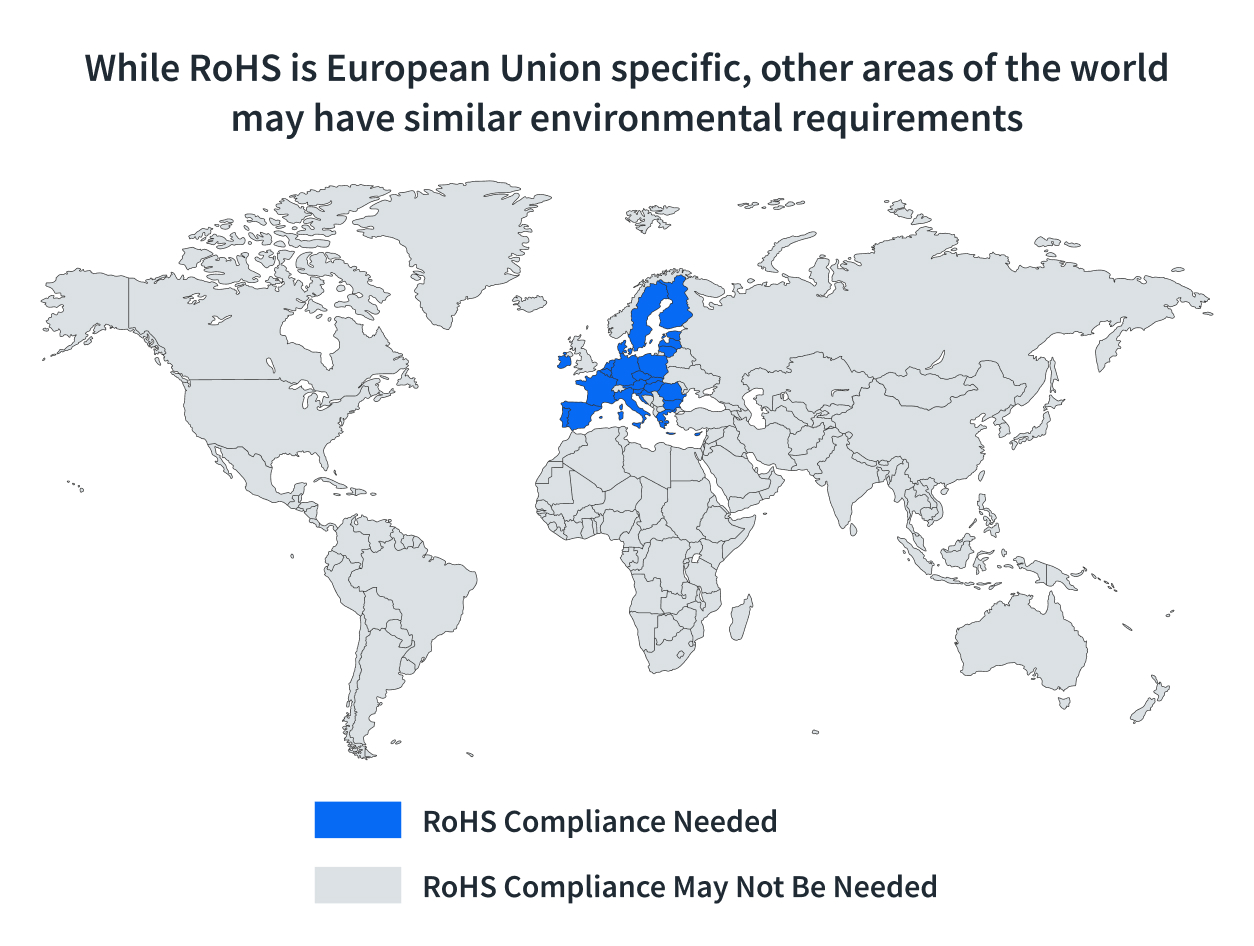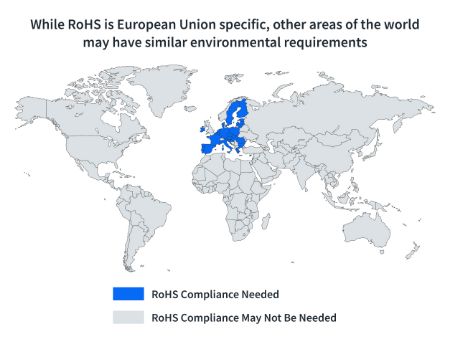The short answer to this question is that if your products or component parts will not be sold in Europe, then the RoHS directive may not apply to you. But hold on a minute. As is always the case, the long answer is not that simple. Allow us to explain.
First, What is RoHS?
RoHS, which stands for Restriction of Hazardous Substances, is directive 2002/95/EC of the European Union (EU), which was adopted in 2003, took effect in 2006, and has been expanded several times. It effectively restricts the use of certain hazardous substances in electrical and electronic equipment sold in the EU, including cables and spare parts.
If your business sells or distributes applicable products, components, or sub-assemblies directly to EU countries, resellers, distributors, or integrators using your parts in products sold to EU countries, then you need to pay attention if you use any of the restricted materials.

The stated goal of the RoHS directive is to “reduce potential environmental and health risks caused by the use of hazardous substances during the utilization, collection, treatment, and disposal of increasing amounts of electrical and electronic waste.”
The RoHS directive means that all applicable products in the EU must pass RoHS compliance to be sold in any EU country. The substances banned by the directive are:
- Lead
- Mercury
- Cadmium
- Hexavalent Chromium
- Polybrominated Biphenyls (PBB)
- Polybrominated Diphenyl Ethers (PBDE)
- Di (2-ethylhexyl) Phthalate (DEHP)
- Benzyl Butyl Phthalate (BBP)
- Dibutyl Phthalate (DBP)
- Diisobutyl Phthalate (DIBP)
Products that contain any of these substances may include essentially any electrical or electronic equipment, such as (but not limited to): appliances, computers and telecommunications equipment, lighting, consumer electronics, electrical or electronic tools, toys, medical devices, and industrial monitoring and control products. There are some products and specific applications that are excluded from the RoHS requirements, but not many.
Also, you should be aware that seven additional substances are currently in consideration to be added to this list of banned chemicals. While not presently on the RoHS list, these substances include:
- Beryllium
- Cobalt (dichloride and sulphate)
- Diantimony Trioxide
- Indium Phosphide
- Medium-Chain Chlorinated Paraffins (MCCP)
- Nickel (sulphate and sulfamate)
- Tetrabromobisphenol A (TBBP-A)
How Do You Comply with RoHS?
If you are a manufacturer or distributor of systems or components and wish to sell into the EU in the ways we have noted, you need to evaluate and verify that either your products do not contain any of these substances or, if they do, that they do not exceed the individual limits specified in the directive. You must self-certify your production controls and also complete a Declaration of Conformity to demonstrate compliance.
You will also need to verify that the companies in your supply chain for your relevant products are also in compliance with the regulations. This may require declarations of compliance or certification from an independent testing lab.
While each EU member state uses the RoHS directive as a guide to set its own enforcement and implementation policies, you should be aware that authorities in each of the EU member states may conduct random in-market surveillance to check products for RoHS compliance. If not compliant, they may require proof of due diligence to meet the requirements.
How Does this Affect CE Marking of Products?
CE (Conformite Europeenne) product marking is another indication that a product has been self-assessed by the manufacturer to meet EU safety, health, and environmental protection requirements. In order to use the CE mark, manufacturers must complete their own conformity assessment covering all relevant EU requirements, set up a technical file that documents conformity, complete an EU declaration of conformity, and affix the CE mark to their products. These documents must be provided to any EU member national authority upon request.
The CE mark is required for certain (but not all) products to be sold in the EU. RoHS compliance is required for CE marking of products. So, all manufacturers of electrical or electronic products must be in compliance with RoHS before the CE mark can be applied to their products. The marking for a RoHS compliant product is the CE mark.
Does the RoHS Directive Apply Only in the EU?
Here is where things can get a bit tricky for manufacturers. All applicable electrical or electronic products must pass RoHS compliance in order to be sold in any EU country. However, several U.S. states have implemented their own regulations based on the RoHS directive and currently restrict a partial list of the regulated substances covered by RoHS.
These states include California, New Jersey, New York, Illinois, Indiana, Minnesota, Rhode Island, and Wisconsin. For example, California requires that in order to be sold in the state, covered electrical and electronic devices must meet the RoHS restrictions for heavy metals.
In addition, according to the National Institute of Standards and Technology, widely varying guidelines based on the RoHS directive have also been implemented in various countries, including:
- China
- Japan
- Taiwan
- South Korea
- Norway
- Russia
- Belarus
- India
- Ukraine
- Singapore
- UAE
- Turkey
- Kazakhstan
- Kyrgyzstan
- Saudi Arabia
The levels of product regulation, enforcement, penalty, and exclusion can vary greatly from country to country. If your products are RoHS compliant in the EU, however, it is safe to say that you may already be close to meeting the requirements in many of the additional countries on this list. Working closely with the engineering professionals at an authorized component distributor can help guide you through this process.
Summary
As an engineer or purchasing professional, you both understand and have to deal with the various regulations, mandatory or voluntary requirements, and standards and specifications that exist to market your products. Worldwide marketing efforts only add to the demands on your intelligent use of components, manufacturing processes, and supply chain organizations that meet modern guidelines. The RoHS directives are a good example of how the development of regulations meant for an individual economic entity, like the EU, can be used worldwide to achieve the same end.
So, is RoHS compliance a good idea, even if you don’t sell into the EU? It would appear that the safe answer to this question is - Yes.
You can get more information about product guidelines and certifications from our friends at CircuitBread.com, who have information available on UL and CSA certifications on their website. Read about it here: UL and CSA Certifications. What do they mean to me?
contact us:
 EN
EN
 English
English
 Chinese
Chinese
 Italiano
Italiano
 Portuguese
Portuguese
 Deutschland
Deutschland
 French
French
 Russian
Russian
 Japanese
Japanese
 Turkish
Turkish
 Korean
Korean
 Spanish
Spanish
 my account & orders
my account & orders


